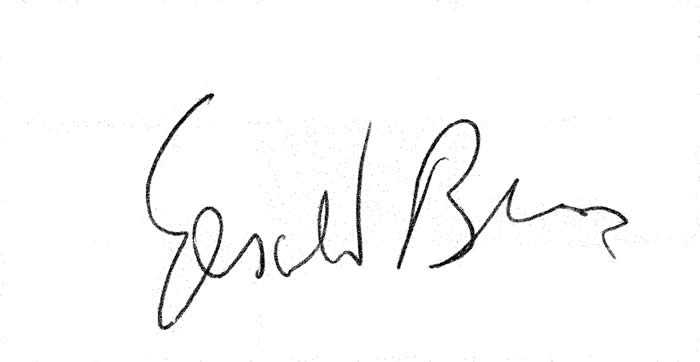
write about. Simple declarations don't often work. Alabaster vases beloved of Symbolists
diffuse light through their hardness, darker at the curled lip. A small silver scarab contains
inside itself a book, one of six, the convention that these things are beautiful.
To go to Paris when the leaves are transparent would also be good, in 1931.
Recent instances of the Bad Sentence made into art arrest us, page-long stretches
of taste, the fossil beast on its nest with eggs, lost in a sandstorm, picked out by
dental tools, that the nest and eggs are there complete significant, extinct.
Helen with her alabaster lamp, you see, is meant to illuminate a mode of being.
At the end you can discard everything, even the particular.
The amber is a metaphor, a bee in it, anything, as Pope's line in the poem went,
"and wonder how the devil it got there." Said of anything in any poem.
It's been a hard year. I write this in V-Mail Black, a fat bottle of Skrip with the well
in its side Scott bought me, still in its box, from wartime. The ink, surely as black
as what I use now, has gone reddish-brown with age, like a very dark port,
still usable, V and MAIL on the label separated by a dot-dot-dot-dash, very period.
A woman I met who worked in a powdered-egg plant in wartime told me
they went to glycerine-painted eggs in their shells. Doubtless, I said, the troops
were grateful. Oh yes, she said, her husband said they should pack their names and addresses
in the crates and they did and the town got tons of mail back. Rowse remarks
what it was like to stick out World War II in England, nothing like it since. Auden
missed it. When I was in London Michael Gough was in a three-person show of Eliot's
writings, a theater off Leicester Square and I didn't go. In a nearby shop I found a slim,
nearly vintage volume of Auden's Poems. I didn't buy it. An error in its way not to
have it in period paper, Thomas's 18 Poems, signed, next door, not, as Scott says,
his bar signature, but decorous. Myself thrown into period by this palish ink.
Edward Bell, reading toward his 20,020-line long poem, said three friends a little older
than he was at nineteen studied the Egyptian Book of the Dead and were dead within a year.
Jain myths occupy him a little while. Carrie has presentiments, dead in a car wreck,
such. My visions were hypnagogic hallucinations, rare, a book says, after the age of twelve --
brightly illuminated subjects contemplated on the edge of sleep the dreamer can't alter.
Seance mediums, it said, suffer from mythomania, which Coleridge had, a tendency to believe
your own lies. Aside from proving a strong eidetic imagination hypnagogy proves nothing. Has,
that's to say, no discernible function at all. The faces I saw, reptilian, as if carved in wood
with microscopic care, became toward the end human faces which like Bacon portraits
would change, melt into another, still characteristic, wood masks sanded and enameled,
Baird's Punch, or the comedians on backs of breakfast foods with tabs, Wynn, Caesar.
The faces you dream you dream are the fronts of heads, personal like handwriting.
A Fire Watcher mask I still remember, dark African wood, dead simple, had washers for eyes
which looked in their slightly rusty brightness permanently startled, which was the intent.
A Hugh MacDiarmid mask on a cornflakes box would be marvelous, that huge brow on
tiny gnome features, twisty hair. Amy Lowell with pince-nez, quizzical, with cigar.
Barbara is looking at Constable clouds, and loves it that he held back from
the Royal Academy, wouldn't even sell it, one picture someone referred to
as a "horrible green thing." Lately I've been wounded, urged to check out
a Polish novelist "because he's so analytic." "And am I?" "Well, no," whuff whuff.
I have the modesty of those who know that anything anyone says of them is true, lately
enduring quite a lot of that, "and never fought back," says one, her sentence poised between
conflicting sounds, self-knowledge like the length of what follows an enjambment.
Leuth said, after long silence, that an artist seems to be after what is meant.
Barbara thinks my lists are full of sorrow. To most they're academic, horrible green
things. Tennyson's second volume is full of "airy, fairy Lilian" repeats, innately
vulnerable to reviewers so unlike the friends who couldn't praise his verse enough.
Well, they were right, at least prospectively. Two photographs of me drinking stout,
one serious, one smiling, might go at the beginning and end of any book I write. "Do"
is the verb, I said to Leuth, as Edward and I did rum, or Ponge the Chrysanthemum.
Copyright Gerald Burns 1995-1997